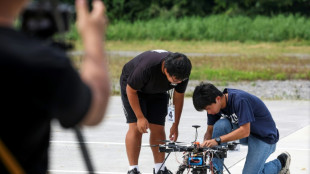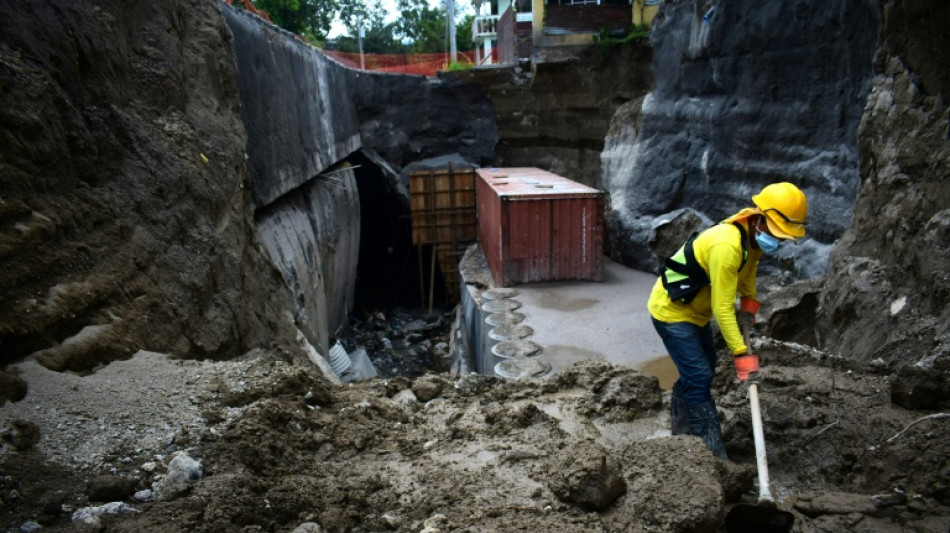
-
 Russian drones, missiles pummel cities across Ukraine
Russian drones, missiles pummel cities across Ukraine
-
First artwork by humanoid robot sells for over $1.0 million

-
 China to raise local govt debt ceiling to boost struggling economy
China to raise local govt debt ceiling to boost struggling economy
-
Climate change poses multiple risks for banks

-
 Boxing club helps fight Greenland's suicide scourge
Boxing club helps fight Greenland's suicide scourge
-
Retired Olympian Daley dives into the spool with Tokyo knitwear show

-
 Japanese organ builder 'honoured' to restore voice of Notre Dame
Japanese organ builder 'honoured' to restore voice of Notre Dame
-
Sony quarterly net profit jumps but forecast unchanged

-
 Asian markets struggle to maintain momentum after Fed cut
Asian markets struggle to maintain momentum after Fed cut
-
Fur flies as Russia takes on young fans of 'quadrobics'

-
 Pharrell Williams to bring star power to Web Summit tech event
Pharrell Williams to bring star power to Web Summit tech event
-
On Kinshasa's streets hairdressers make a quick buck

-
 Rauf takes five as Australia out for 163 in 2nd Pakistan ODI
Rauf takes five as Australia out for 163 in 2nd Pakistan ODI
-
Harris thrusts himself into pole position in Australia 'bat-off'

-
 Trump makes first cabinet pick, eyes Putin talks
Trump makes first cabinet pick, eyes Putin talks
-
Qantas plane returns to Australia airport due to 'engine failure', sparks fire

-
 Jackson leads thrilling Ravens comeback over Bengals
Jackson leads thrilling Ravens comeback over Bengals
-
Why young men turned out in droves for Donald Trump

-
 China poised to approve more help for ailing economy
China poised to approve more help for ailing economy
-
Philippines cleans up after Typhoon Yinxing slams north coast

-
 Bucks snap losing streak with Jazz rout
Bucks snap losing streak with Jazz rout
-
Quesada fears rustiness as Italy face Argentina in opening November Test

-
 Hard graft takes 140kg 'big sponge' Tatafu to France debut
Hard graft takes 140kg 'big sponge' Tatafu to France debut
-
Asian markets extend rally after Fed cut

-
 'Constant threat' Dupont back for France against Japan
'Constant threat' Dupont back for France against Japan
-
Bestaven in pursuit of sailing's 'holy grail' in Vendee Globe

-
 French monument Saint-Etienne eye success again under new ownership
French monument Saint-Etienne eye success again under new ownership
-
Bayern look to extend lead as Kompany makes his mark

-
 Sinner ATP Finals favourite after brilliant and controversial year
Sinner ATP Finals favourite after brilliant and controversial year
-
Cracked earth in Greece's saffron heartland as drought takes toll
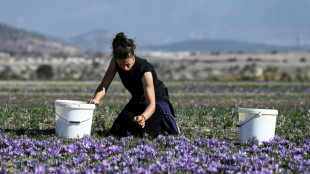
-
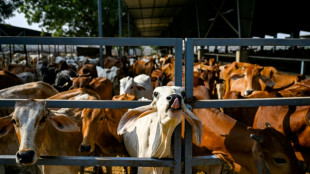 Sacred cow: coal-hungry India eyes bioenergy to cut carbon
Sacred cow: coal-hungry India eyes bioenergy to cut carbon
-
Cafe in Libya champions recycling and sustainability

-
 Man City seek to end mini-slump as Liverpool soar
Man City seek to end mini-slump as Liverpool soar
-
Facing Trump's return, EU confronts economic challenges

-
 West Indies bowler Joseph suspended after storming off field
West Indies bowler Joseph suspended after storming off field
-
Young African players chase football 'dream' in Brazil

-
 Defeat to Trump prompts Democratic soul-searching
Defeat to Trump prompts Democratic soul-searching
-
Trump rides global wave of anti-incumbency

-
 First artwork by humanoid robot sells for $1.3m
First artwork by humanoid robot sells for $1.3m
-
Power partly restored in Cuba after Hurricane Rafael
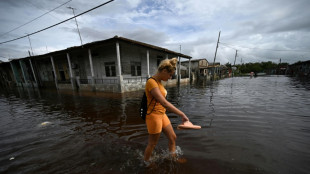
-
 NBA Lakers assign Bronny James to G-League squad
NBA Lakers assign Bronny James to G-League squad
-
Galatasaray down Spurs in Europa League, Man United end wait for win

-
 Dodgers pitcher Kershaw aims to be 'good as can be' after surgeries
Dodgers pitcher Kershaw aims to be 'good as can be' after surgeries
-
Global stocks mostly rise as Fed, Bank of England cut rates

-
 US Fed makes quarter point cut as Powell insists he would not quit
US Fed makes quarter point cut as Powell insists he would not quit
-
Biden vows peaceful White House handover, Trump eyes Putin talks

-
 One Direction star took cocaine, alcohol, antidepressant before death
One Direction star took cocaine, alcohol, antidepressant before death
-
F-15 fighters arrive in Middle East: US military

-
 Zelensky says 'unacceptable' to offer Russia concessions on Ukraine
Zelensky says 'unacceptable' to offer Russia concessions on Ukraine
-
Undocumented immigrants in US 'terrified' as Trump returns


Climate, poverty collude to torment Central America
Every time it rains, Blanca Arias in El Salvador and Sandra Ramos in Honduras fear that flooding will raze their precarious homes and leave their families destitute. Again.
It is a fate that strikes all too often in parts of Central America and, experts say, ever more frequently and severely due to climate change.
Corruption, crumbling infrastructure, uncontrolled urbanization and poverty -- which afflicts 60 percent of Central America's 50 million inhabitants -- all combine to leave more and more people exposed to natural disasters.
And the region has many: from volcanic eruptions, drought and heat waves to regular flooding brought on by tropical storms and hurricanes.
In July this year, Tropical Storm Bonnie unleashed a downpour on San Salvador, flooding Arias's humble dwelling and many others built in a ravine in the capital's southeast.
Her house was left "in ruins," Arias told AFP, and she lost everything she needs for her artisanal ice cream business.
"We have nowhere to go," the 58-year-old said.
In neighboring Honduras, 22-year-old Ramos lives in a state of constant nervousness on the banks of the Ulua River.
"A little while ago, a fortnight ago, we were scared because they announced a very strong hurricane. We went to look at the river, the river filled up ... some of it drained into the valley.
"All of this alarms us, because we are in a risk zone and we cannot be at ease," she said.
- Vicious cycle -
When both Hurricane Eta and Iota hit in October 2020, Ramos said her entire settlement became flooded.
"All the houses were lost, we lost everything."
The UN's Economic Commission for Latin America and the Caribbean estimates that the hurricane duo caused damage exceeding $2 billion in Honduras alone.
In 2021, according to a World Food Programme report, more than 8.4 million people in Guatemala, Honduras, El Salvador and Nicaragua were in a food "crisis" due to conflict, economic shocks resulting from the coronavirus epidemic, and extreme weather events.
It is a vicious cycle.
"Poverty makes the same people look for the cheapest areas to live in and those are usually the most vulnerable zones," Ricardo Navarro, president of the CESTA environmental NGO told AFP.
The areas of Central America most exposed to tropical cyclones are on the Caribbean and Pacific coasts, both stretching almost 3,000 kilometers (some 1,800 miles) in length, and heavily populated.
Experts regularly warn of the danger of high-density settlements in high-risk areas.
In some areas of Nicaragua, for example, "there was a time when rivers shrunk and people built (homes) in their beds or very close to the rivers which, of course, returned to their normal flow," said Janett Castillo, of the Nicaraguan National Risk Management Board (MNGR).
"Nature reclaims the space that humans invade," added Magdalena Cortez of the Salvadoran risk-management NGO MPGR, who said that to minimize risk, "we must respect nature."
Despite the many disasters afflicting the region, "civil protection systems have been weakened" by government neglect, said Guido Calderon of the Cociger risk management NGO in Guatemala.
Every time there is an event, the systems mobilize for a rapid response, "and then leave those affected abandoned," he said.
- 'Uncontrolled exploitation' -
Back in Honduras, Jose Ramon Avila of the NGO coalition ASONOG said the vulnerability exposed by Hurricane Mitch in 1998 -- which was the country's worst-ever natural disaster with more than 5,000 deaths -- has only become worse with "uncontrolled exploitation of forests" ever since.
Flooding has worsened due to a changing climate, said Avila, with "abundant rainfall in shorter periods, which in turn saturates the soil" that would normally absorb the excess water.
According to a 2021 report of the Inter-American Development Bank, a total of 81 weather disasters killed 26,887 people in Honduras between 1970 and 2019.
In some areas, the country has sought to deal with the threat by building stone-and-soil dikes.
But when Hurricane Eta hit, even those barriers were overwhelmed, remembered Ramos.
After the water receded, she and her neighbors returned and settled in makeshift huts, slowly rebuilding their lives, but with no faith left in the dikes.
Now, every time a storm is forecast, they get ready to leave.
"We can lose the little we have collected -- the animals, even our lives," Ramos said.
S.Keller--BTB


